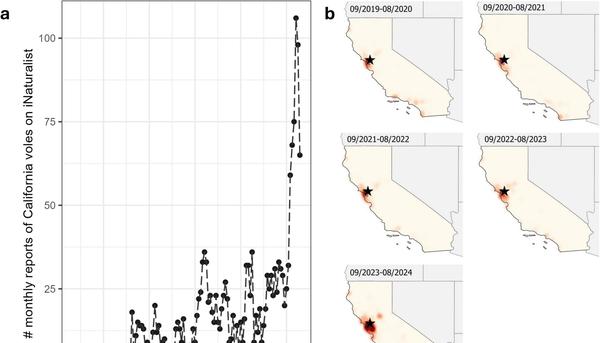Ground Squirrels Turn Predatory in California
Recent observations reveal California ground squirrels have developed aggressive hunting behavior, actively preying on field mice. This shift challenges the common perception of ground squirrels as primarily herbivorous animals.

The recent discovery of California ground squirrels hunting field mice has sparked interest within the scientific community. While traditionally viewed as seed and nut consumers, these adaptable rodents have demonstrated sophisticated predatory behavior that suggests a more complex dietary pattern than previously understood.
Research conducted between June and July shows ground squirrels engaged in 74 interactions with field mice, with over 32 encounters ending in successful predation. The hunting technique observed is remarkably similar to that of cats - the squirrels stalk their prey by maintaining a low profile, then launch a swift attack targeting the neck region of the field mouse.
This behavioral shift appears to coincide with an unprecedented surge in the local field mouse population, which has reached nearly seven times the average levels observed over the past decade. The ground squirrels' adaptation to this abundance of potential prey demonstrates their dietary flexibility and opportunistic nature.
However, this is not entirely unexpected from an evolutionary perspective. Historical records indicate that California ground squirrels have always maintained an omnivorous diet, consuming insects, bird eggs, and occasional small prey when available. What makes the current situation notable is the scale and systematic nature of their hunting behavior.
The squirrels display remarkably consistent hunting patterns. After capturing their prey, they systematically remove the head before consuming the meat, internal organs, and soft bones. This specialized technique has spread throughout the local ground squirrel population, suggesting a form of social learning.
This case provides valuable insights into how environmental pressures can drive rapid behavioral adaptations in wildlife populations. The ground squirrels' shift toward more active predation may represent a natural response to changing ecological conditions rather than an evolutionary leap.
Their behavior also highlights the complexity of ecosystem relationships and how species can adjust their roles within food webs based on environmental circumstances. This flexibility in feeding strategies has likely contributed to the success of ground squirrels across diverse habitats in North America.